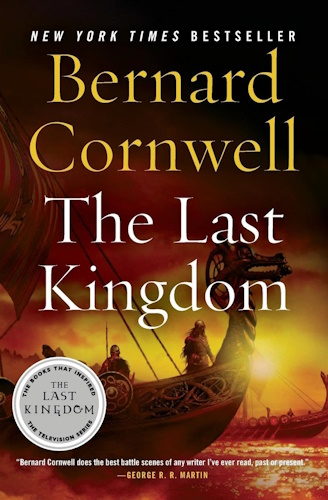
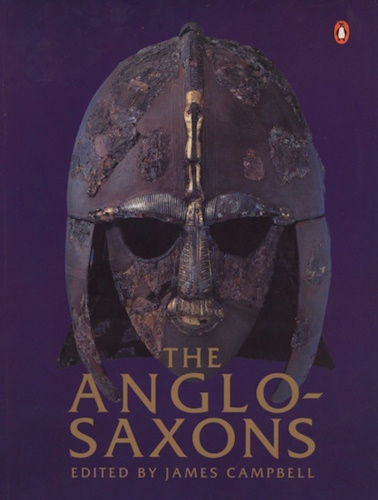

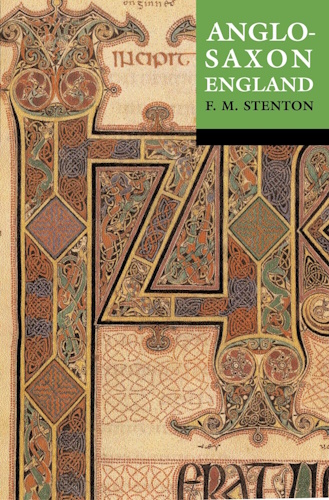

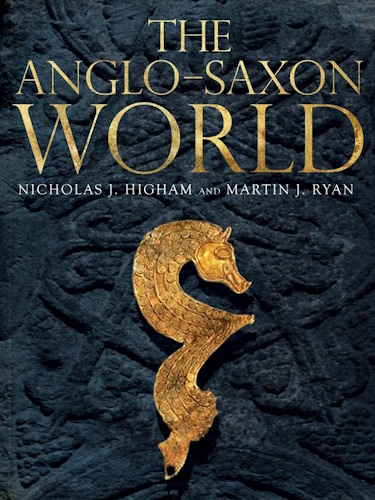



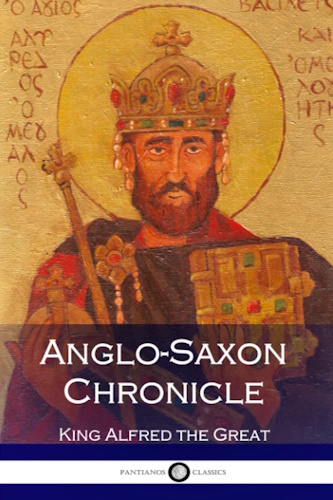

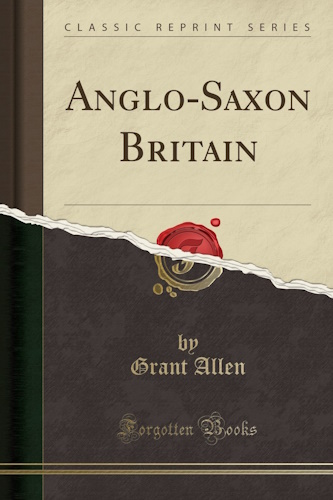

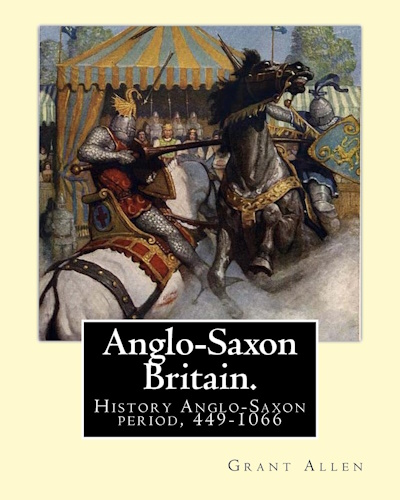


'Uhtred the Bold'
The Real Uhtred of Bebbanburgh
The BBC's historical drama The Last Kingdom has just begun its long awaited second series. The first series aired in 2015 and quickly gained a large fan following, including myself. Based on the Saxon Stories series by Bernard Cornwell, the series takes place in 9th century Britain, a land divided, and dominated by the Danes. The main protagonist, Uhtred of Bebbanburg, is partly based on a real Anglo Saxon man, Uchtred or Uhtred the Bold.
Vicious Vikings
In the fifth century, Britain was divided by loosely defined borders, the communities ruled by chieftains or kings. After the Romans left for good in 408 AD, the Britons faced wave after wave of invaders, the Anglo-Saxons being among them. After failed invasion attempts during the 4th century, they succeeded and settled in around 450 AD. Britain was then split into regions, known as The Heptarchy, from the Greek hepta for seven, and arkho, 'to rule'. The first mention of these kingdoms comes from a 12th century manuscript, Historia Anglorum. These regions were Mercia, East Anglia, Essex, Sussex, Kent, Northumbria and Wessex, each with their own King. The Vikings first invaded in 793 AD.
By the 9th century, eviscerated by the Danes, only Wessex remained solely under Saxon rule when the story takes place, led by King Aethelred (865–871). His brother Alfred, however, is the main focus. A pious Christian, and his brother's heir, he is intent on uniting the country; one England, worshipping one God, under one king. He became king of Wessex in 871 on the death of King Aethelred, and would later become known as Alfred 'the Great'. His brother Aethelred had left two young sons, Aethelhelm and Aethelwold. However, the brothers had agreed that whoever outlived the other would inherit the property that King Aethelwulf, their father, had left them both in his will, and thus the throne (this agreement is not mentioned in the episode). By translating the works of Bede, Alfred would begin to create a country that knew its history, and which was governed by unified laws and justice for the first time since the Romans departed. But it would not be him, but his grandson, that would be crowned the first king of England.
Fact and fiction
In the series, ten year old Uhtred Uhtredson, born Osbert, becomes ealdorman (the equivalent of an earl) of Bebbanburg in the kingdom Northumbria after losing his elder brother and soon after, his father, in the struggle against the Danes. During the battle that killed his father, young Uhtred is kidnapped and taken as a slave by Ragnar 'the fearless', a Danish warlord. Admiring his fighting spirit, Ragnar refuses Aelfric, Uhtred's uncle, in his attempt to buy him back, and raises him as his own, as a Dane. Uhtred embraces their lifestyle and beliefs, casting aside his Christian upbringing.
His namesake, Uhtred 'the Bold' of Northumbria, was the ealdorman of Banburg, what we now know as Bamburgh, from 1006 till his death in 1016. Uhtred's birth date is unclear; various sources claim 971, or 989. He is recorded as helping to move the remains of St Cuthbert in the year 995, which would make 971 seem the most likely, putting his age at the time at 24. He was born to Waltheof of Bamburgh, the son of Osulf I, the first recorded high-reeve (believed to be a deputy to an ealdorman) of Bamburgh. His is a Scandinavian name, which suggests Viking heritage. His mother appears to be unknown. At this point, Ethelred II 'the Unready' (978–1016) was king of England.
Little is known of Uhtred's earlier years. As aforementioned, he is recorded by Symeon of Durham, a chronicler and monk at Durham Priory, in his Historia Eccleiae Dunelmensis as helping the monks move relics from Chester-le-Street to Durham in 995, and clearing a site for the cathedral. One Bishop Aldhun founded the cathedral, and Uhtred would marry his daughter, Ecgfrida around this time. In doing so he inherited a portion of church lands in Durham. He and Ecgfrida would have two children together, Eldred and Eawulf. In 1006, Durham was taken under siege by Malcolm II of Scotland. Uhtred's ageing father left the defence to him. Uhtred rallied men from all over Bernicia (Northern Northumbria, consisting of Northumberland and Durham, also Berwickshire and East Lothian, now belonging to Scotland) and Yorkshire. It was a heavy defeat for the Scots, their severed heads displayed on Durham's walls. Malcolm however lived. As a reward for his actions, Uhtred was appointed ealdorman of Northumbria by King Ethelred in 1007, while his father still lived. Aelfhelm of York, who had taken no action during the siege, was murdered on the king's orders. Uhtred then succeed Aelfhelm as ealdorman of York, uniting northern and southern Northumbria.
In 1016, Uhtred faced King Malcolm once more. The Scottish king allied himself with Owain the Bald, King of Strathclyde. Together they razed much of Northumbria to the ground, and faced Uhtred's local force at the Battle of Carham, which took place south of the River Tweed. Symeon of Durham describes the battle:
"In the year of our Lord's incarnation ten hundred and eighteen, while Cnut ruled the kingdom of the Angles, a comet appeared for thirty nights to the people of Northumbria, a terrible presage of the calamity by which that province was about to be desolated. For, shortly afterwards, nearly the whole population, from the river Tees to the Tweed, and their borders, were cut off in a conflict in which they were engaged with a countless multitude of Scots at Carrun."
It was Uhtred's forces this time who suffered heavy losses. By this point, parts of north Northumbria had been reclaimed by the Scots. The date of the battle is disputed, between 1016 and 1018. Uhtred however, is believed to have been murdered in 1016, but it is also claimed that he was killed in the battle. Bishop Aldhun, his father in law, is said to have died of grief after hearing of his death. This seems slightly odd, considering that in 1007 Uhtred dismissed his first wife Ecgfrida after roughly 12 years of marriage, in order to marry Sige, the daughter of Styr, a rich York citizen. In doing so he consolidated his place as ealdorman of York, and fathered a further two sons, Eadulf and Gospatric. All did not go to plan however, as the marriage did not sit well with Styr's enemy, Thurbrand the Hold. This leads us onto Uhtred's supposed murder. When Sweyn Forkbeard landed his army in 1013, many of the nobles, disillusioned with Ethelred, submitted to him, Uhtred included. Sweyn was declared King of England, but his reign was short. After he died in 1014, Elthelred returned. In a bid to win back Uhtred's support, he offered his daughter Aelfgifu to Uhtred as his bride. He accepted, divorcing Sige. Women of the era were often seen as 'peace weavers', and marriages such as Uhtred's were common. When in 1015, Sweyn's son Cnut made a claim to the throne, Uhtred of course sided with his brother in law, Ethelred's son Edmund Ironside. But Cnut had allied with Thurbrand. Cnut's forces were too large, and Uhtred was forced to submit to him as king. He attempted to negotiate his position, and was summoned to a meeting with the new King Cnut. On his way, he and 40 of his men were murdered by Thurbrand, with Cnut's consent. Uhtred's brother, Eadwulf, inherited Bamburgh, but Cnut created Norwegian Eric of Hlathir, his brother in law and ally, ealdorman of southern Northumbria. North and south, united under Uhtred, were now separate again. Uhtred's murder triggered a blood feud, and Uhtred's son Ealdred would eventually avenge his father by killing Thurbrand, only to later be murdered by Thurbrand's son Carl. Years later, in 1070 Ealdred's grandson would avenge him by having Carl's sons and grandsons killed.
Uhtred's sons would continue to rule Bernicia; Ealdred until his murder in 1038, and Eadwulf until his death in 1041. It then passed to his son, Osulf, until 1067, when he was killed. Uhtred's third marriage produced a daughter, Ealdgyth,(Edith) who married Maldred, the brother of Duncan I of Scotland. Their son, Gospatric, was Earl of Northumbria from 1068 to 1072. (Another possibility is that Gospatric was Uhtred's youngest son, born to his second wife Sige. A third possibility is that he was a grandson of Ecgfrida, through her second marriage). With battles, changing political alliances and murder, the life of Uhtred the Bold was just as dramatic as that of his fictional counterpart.
Sources
http://cybergata.com/roots/1660.htm
Birth of England: The Wessex Kings
A Biographical Dictionary of Dark Age Britain: England, Scotland and Wales, C.500-c. 1050, Ann Williams, Alfred P. Smyth, D.P Kirby, 2014
Battle Trails of Northumbria, Clive Kristen, 2004
Bloodfeud: Murder And Revenge In Anglo Saxon England, Richard Fletcher, 2004
The Anglo Saxon Chronicles, translated by Rev. James Ingram, 1823.
Horrible Histories: Vicious Vikings, Terry Deary.
History of Britain by Simon Schama, documentary.
![]()
![]()
Disclaimer:
Some material presented will contain links, quotes, ideologies, etc., the contents of which should be understood to first, in their whole, reflect the views or opinions of their editors, and second, are used in my personal research as "fair use" sources only, and not espousement one way or the other. Researching for 'truth' leads one all over the place...a piece here, a piece there. As a researcher, I hunt, gather and disassemble resources, trying to put all the pieces into a coherent and logical whole. I encourage you to do the same. And please remember, these pages are only my effort to collect all the pieces I can find and see if they properly fit into the 'reality aggregate'.
Personal Position:
I've come to realize that 'truth' boils down to what we 'believe' the facts we've gathered point to. We only 'know' what we've 'experienced' firsthand. Everything else - what we read, what we watch, what we hear - is what someone else's gathered facts point to and 'they' 'believe' is 'truth', so that 'truth' seems to change in direct proportion to newly gathered facts divided by applied plausibility. Though I believe there is 'truth', until someone representing the celestial realm visibly appears and presents the heavenly records of Facts And Lies In The Order They Happened, I can't know for sure exactly what "the whole truth' on any given subject is, and what applies to me applies to everyone. Until then I'll continue to ask, "what does The Urantia Book say on the subject?"
~Gail Bird Allen
![]()
![]()














-
Urantia Book, 44:0.11 - The Celestial Artisans
Never in your long ascendancy will you lose the power to recognize your associates of former existences. Always, as you ascend inward in the scale of life, will you retain the ability to recognize and fraternize with the fellow beings of your previous and lower levels of experience. Each new translation or resurrection will add one more group of spirit beings to your vision range without in the least depriving you of the ability to recognize your friends and fellows of former estates.
-
Princess Bride 1987 Wallace Shawn (Vizzini) and Mandy Patinkin (Inigo Montoya)
Vizzini: HE DIDN'T FALL? INCONCEIVABLE.
Inigo Montoya: You keep using that word. I do not think it means what you think it means. -
Urantia Book, 117:4.14 - The Finite God
And here is mystery: The more closely man approaches God through love, the greater the reality -- actuality -- of that man. The more man withdraws from God, the more nearly he approaches nonreality -- cessation of existence. When man consecrates his will to the doing of the Father's will, when man gives God all that he has, then does God make that man more than he is.
-
Urantia Book, 167:7.4 - The Talk About Angels
"And do you not remember that I said to you once before that, if you had your spiritual eyes anointed, you would then see the heavens opened and behold the angels of God ascending and descending? It is by the ministry of the angels that one world may be kept in touch with other worlds, for have I not repeatedly told you that I have other sheep not of this fold?"
-
Urantia Book, Foreword - 0:12.12 - The Trinities
But we know that there dwells within the human mind a fragment of God, and that there sojourns with the human soul the Spirit of Truth; and we further know that these spirit forces conspire to enable material man to grasp the reality of spiritual values and to comprehend the philosophy of universe meanings. But even more certainly we know that these spirits of the Divine Presence are able to assist man in the spiritual appropriation of all truth contributory to the enhancement of the ever-progressing reality of personal religious experience—God-consciousness.
-
Urantia Book, 1:4.3 - The Mystery Of God
When you are through down here, when your course has been run in temporary form on earth, when your trial trip in the flesh is finished, when the dust that composes the mortal tabernacle "returns to the earth whence it came"; then, it is revealed, the indwelling "Spirit shall return to God who gave it." There sojourns within each moral being of this planet a fragment of God, a part and parcel of divinity. It is not yet yours by right of possession, but it is designedly intended to be one with you if you survive the mortal existence.
-
Urantia Book, 1:4.1 - The Mystery Of God
And the greatest of all the unfathomable mysteries of God is the phenomenon of the divine indwelling of mortal minds. The manner in which the Universal Father sojourns with the creatures of time is the most profound of all universe mysteries; the divine presence in the mind of man is the mystery of mysteries.
-
Urantia Book, 1:4.6 - The Mystery Of God
To every spirit being and to every mortal creature in every sphere and on every world of the universe of universes, the Universal Father reveals all of his gracious and divine self that can be discerned or comprehended by such spirit beings and by such mortal creatures. God is no respecter of persons, either spiritual or material. The divine presence which any child of the universe enjoys at any given moment is limited only by the capacity of such a creature to receive and to discern the spirit actualities of the supermaterial world.
-
Urantia Book, 11:0.1 - The Eternal Isle Of Paradise
Paradise is the eternal center of the universe of universes and the abiding place of the Universal Father, the Eternal Son, the Infinite Spirit, and their divine co-ordinates and associates. This central Isle is the most gigantic organized body of cosmic reality in all the master universe. Paradise is a material sphere as well as a spiritual abode. All of the intelligent creation of the Universal Father is domiciled on material abodes; hence must the absolute controlling center also be material, literal. And again it should be reiterated that spirit things and spiritual beings are real.
-
Urantia Book, 50:6.4 - Planetary Culture
Culture presupposes quality of mind; culture cannot be enhanced unless mind is elevated. Superior intellect will seek a noble culture and find some way to attain such a goal. Inferior minds will spurn the highest culture even when presented to them ready-made.
-
Urantia Book, 54:1.6 - True And False Liberty
True liberty is the associate of genuine self-respect; false liberty is the consort of self-admiration. True liberty is the fruit of self-control; false liberty, the assumption of self-assertion. Self-control leads to altruistic service; self-admiration tends towards the exploitation of others for the selfish aggrandizement of such a mistaken individual as is willing to sacrifice righteous attainment for the sake of possessing unjust power over his fellow beings.
-
Urantia Book, 54:1.9 - True And False Liberty
How dare the self-willed creature encroach upon the rights of his fellows in the name of personal liberty when the Supreme Rulers of the universe stand back in merciful respect for these prerogatives of will and potentials of personality! No being, in the exercise of his supposed personal liberty, has a right to deprive any other being of those privileges of existence conferred by the Creators and duly respected by all their loyal associates, subordinates, and subjects.
-
Urantia Book, 54:1.8 - True And False Liberty
There is no error greater than that species of self-deception which leads intelligent beings to crave the exercise of power over other beings for the purpose of depriving these persons of their natural liberties. The golden rule of human fairness cries out against all such fraud, unfairness, selfishness, and unrighteousness.

